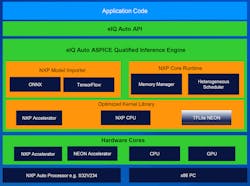Self-driving cars require artificial-intelligence (AI) support, but such technology is needed well before this type of vehicle becomes the norm. Neural networks are a subset of machine learning (ML) that’s in turn a subset of AI. Though ML algorithms have been used in all sorts of other application areas, few require the safety certifications necessary for use in the automotive space.
NXP’s eIQ Auto platform (see figure), which targets the automotive space, is Automotive SPICE (ASPICE) compliant. ASPICE is a German standard derived from the generic SPICE (Software Performance Improvement and Capability dEtermination) (ISO/IEC 15504) standard.
NXP’s eIQ Auto targets all of NXP’s automotive platforms with its ASPICE-qualified inference engine.
The eIQ Auto platform is built around NXP’s ASPICE-qualified inference engine. This supports models from TensorFlow as well as those compatible with the ONNX interchange format. The system is designed to work in heterogeneous environments. It includes optimized libraries for NXP accelerators, CPUs and GPUs. Among the target platforms is NXP’s S32V234 automotive SoC.
The platform supports all automotive applications, from identifying objects detected via radar, vision, or LiDAR, to monitoring facial expressions of the driver. Deep learning can also be used to improve motor control and battery management.
Developer support ranges from training of models to evaluation and deployment. Optimization tools provide critical performance improvement. This can improve performance by a factor of 10X to 30X over non-optimized performance.
About the Author
William G. Wong
Senior Content Director - Electronic Design and Microwaves & RF
I am Editor of Electronic Design focusing on embedded, software, and systems. As Senior Content Director, I also manage Microwaves & RF and I work with a great team of editors to provide engineers, programmers, developers and technical managers with interesting and useful articles and videos on a regular basis. Check out our free newsletters to see the latest content.
You can send press releases for new products for possible coverage on the website. I am also interested in receiving contributed articles for publishing on our website. Use our template and send to me along with a signed release form.
Check out my blog, AltEmbedded on Electronic Design, as well as his latest articles on this site that are listed below.
You can visit my social media via these links:
- AltEmbedded on Electronic Design
- Bill Wong on Facebook
- @AltEmbedded on Twitter
- Bill Wong on LinkedIn
I earned a Bachelor of Electrical Engineering at the Georgia Institute of Technology and a Masters in Computer Science from Rutgers University. I still do a bit of programming using everything from C and C++ to Rust and Ada/SPARK. I do a bit of PHP programming for Drupal websites. I have posted a few Drupal modules.
I still get a hand on software and electronic hardware. Some of this can be found on our Kit Close-Up video series. You can also see me on many of our TechXchange Talk videos. I am interested in a range of projects from robotics to artificial intelligence.



